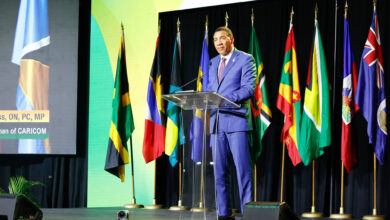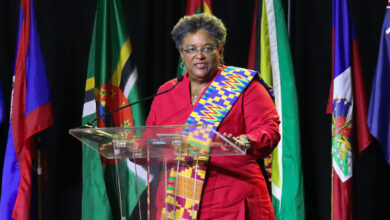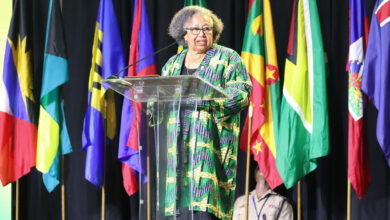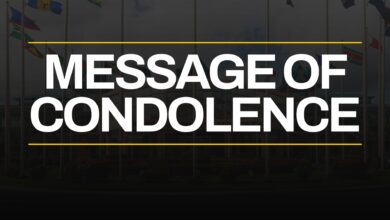Members of Parliament
Colleague Foreign Ministers
Secretary General, Mr Edwin Carrington
Members of the Judiciary, and the Clergy
Members of the Diplomatic Corps
Senior Government Officials
Delegates
Members of the Media
Ladies and Gentlemen
We are meeting at a time when the international community seems preoccupied with war and the consequences of war, in the midst of a global economic meltdown.
Economic and military battle lines have been drawn, and “willing” coalitions of varying strengths and capacities face off against each other in the several theatres of
For us in the Caribbean, our concern at this time is for our survival, caught up as we are in the maelstrom/whirlwind of a veritable economic and trade battle, and a fight for market share, as we struggle to deal with economic transformation; fiscal discipline; poverty alleviation; HIV/AIDS, and now the looming threat of SARS; crime; and the fall out from the September 11 terrorist attacks on the USA.
And there is much cause for concern. We must be concerned when there is a threat to international peace and security, conditions so vital for the pursuit of our economic and social development goals. We must be concerned when international structures and instruments set up to safeguard the interests and the sovereignty and territorial integrity of states, both small and large, appear to be considerably weakened.
As small vulnerable states, it must be troubling for us that the multilateral systems, which are dominated by more affluent and powerful states, for the most part, seem either incapable of, or unwilling to, respond to our region’s particular concerns, when viewed against our deficiency in human and financial resources, our geography and history, and our varying levels of development.
I therefore ask the question… If they cannot be for us, if they cannot act in our collective best interests, then of what relevance are they for us? The United Nations and its Agencies, the Bretton Wood Institutions, the GATT, the WTO?
What therefore is the Caribbean’s response to these formidable challenges: the pressures for conformity with international rules and standards and for reciprocity in trade; the disquieting trend towards unilateralism, as evidenced by the less than strict adherence by some to the principles of multilateralism, diplomacy and dialogue.
Similar challenges confront us within our own region. Despite our recognition of our common history and circumstances, we have not always acted upon our own acknowledgement of the need for consistency and coherence in our actions. We have yet to fully overcome our insularity; be bold enough to confront and wipe out negativity; to hold ourselves to the same high standards of expectation with respect to human rights, justice, equality and good governance; to being our brothers keepers.
We have been criticized of being weak, even divided, in the positions taken as a region on international matters of critical importance. Our approach to the multi-lateral trade negotiations within the hemisphere seems to lack conviction. Further, the slow march towards implementation of the CARICOM Single Market and Economy (CSME), the free movement of persons within our region, and the establishment of the Caribbean Court of Justice (CCJ) has been cause for great concern.
No doubt, our limitation in capacity and human and financial resources has helped to thwart our efforts and dampen our enthusiasm.
At the level of the EU-ACP, and the negotiation of economic partnership agreements (EPA’s) those obvious problems of capacity and resources are compounded by an insufficiency of focus and collaboration, resulting in a general state of unreadiness to confront, by 2005, a new era of trade liberalization without preferential treatment.
The rest of the world however will not wait on us as we grapple with our difficulties. We must seize the opportunities and act together now, in the interest of our various constituents and our region. We must work with our allies to influence positive change in the multilateral institutions to which we belong. We must also make the best use of our scarce regional and national resources for our benefit.
Our survival will depend on how well we are able to face the rest of the world with one common front, one common purpose.If not, we risk being picked off one by one in accordance with the designs and agenda of those more adept and experienced in the machinations of international relations and diplomacy of an economic and other kind.
We must, as sovereign states, continue to resist any attempt to shape the Caribbean agenda for us, despite the pressures and constraints. Our strength lies in our commitment to the promotion of regional prosperity and to reflecting that same commitment in our national development priorities and programmes.
As a community of 15 member states, along with our Associated member states, acting in concert with one another, we can be formidable; and the strategies we employ to ensure our integration into the global economy, and to make our mark in the international community must take cognizance of this fact.
Over the next two days, we will be focusing our attention on a number of issues of relevance to us as a region: the global economic and political developments, including the consequences of the US-led war on Iraq; threats to multilateralism; security concerns; small states issues and the ongoing trade negotiations in the WTO, ACP-EU and the FTAA.
We will also review our current strategy and mechanism for the coordination of our foreign policy, assess their effectiveness, and chart the way forward, taking full account of the challenges and the new dynamics at work internationally and regionally.
Further, we will examine our intra community relations, hopefully in the spirit of openness and frankness befitting members of one Caribbean family, celebrating this year, the 30th anniversary of the Treaty of Chaguaramas, which brought us together, with the noble objectives of creating a common economic space for the pursuit of trade relations, functional cooperation and the harmonization of our foreign policy, while respecting the universally held principles for respect for human rights, sovereignty and territorial integrity, and the rule of international law.
CARICOM has always subscribed to these principles; and we will be failing in our duty, if we do not speak out about any infringement of these principles, particularly within our region. The situation in Cuba and in Haiti, with their various nuances, must therefore give us cause for serious concern. And we must say so, as family and friends.
It is in our collective self interest to seek out partnerships for peace and security. As small open economies we stand to suffer greatly from international discord of a military or economic kind. We must however stand firm on principle and speak out against evils, wherever they exist. Future generations will thank us for it.
I wish to extend a warm Vincentian welcome all my CARICOM colleagues, and special invitees attending this Sixth Meeting of the COFCOR being held in our beautiful multi-island state, and I look forward to fruitful discussions and active participation by all.
I thank you.




